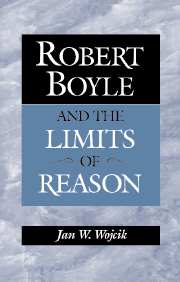Book contents
- Frontmatter
- Contents
- Preface
- Acknowledgments
- Introduction
- Part I The Theological Context
- 1 Things above Reason: Medieval Context and Concepts
- 2 The Threat of Socinianism
- 3 Predestination Controversies
- 4 Theology and the Limits of Reason
- Part II The Context of Natural Philosophy
- Conclusion
- Bibliography
- Index
2 - The Threat of Socinianism
Published online by Cambridge University Press: 24 November 2009
- Frontmatter
- Contents
- Preface
- Acknowledgments
- Introduction
- Part I The Theological Context
- 1 Things above Reason: Medieval Context and Concepts
- 2 The Threat of Socinianism
- 3 Predestination Controversies
- 4 Theology and the Limits of Reason
- Part II The Context of Natural Philosophy
- Conclusion
- Bibliography
- Index
Summary
The Protestant insistence that scripture alone was to be the rule of faith – and the accompanying claim that the laity was competent to interpret scripture – brought with it the inevitable consequence of the proliferation of alternative and conflicting interpretations of scripture, and hence the proliferation of sects. In this chapter, I examine the claims of one of those sects, the Socinians, with an emphasis on their claim that there is nothing in scripture that contradicts human reason. I also examine some of the responses to Socinianism published in England prior to the publication of Boyle's Things above Reason (1681), for it is in these responses to Socinian claims that the rough outlines of the themes developed in Things above Reason are to be found.
The Protestant Background
The claim that scripture contains doctrines that are above reason, but none contrary to reason, was one of the battle cries of the Reformation in England. William Chillingworth (1602–1644), for example, stressed that each individual must use his God-given reason to make a conscious choice between Roman Catholicism and Protestantism. In advocating the study of scripture alone as a rule of faith, Chillingworth observed that although nothing in scripture is contrary to reason, some doctrines of Roman Catholicism require a person to believe things (such as Transubstantiation) that are impossible.
- Type
- Chapter
- Information
- Robert Boyle and the Limits of Reason , pp. 42 - 75Publisher: Cambridge University PressPrint publication year: 1997

